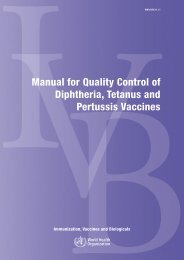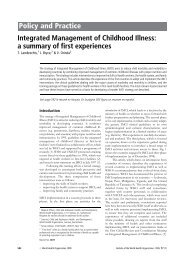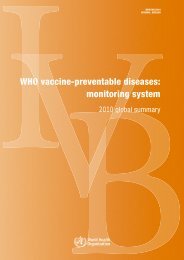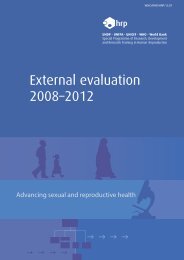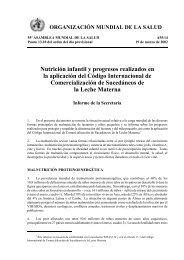IPDE - Extranet Systems - World Health Organization
IPDE - Extranet Systems - World Health Organization
IPDE - Extranet Systems - World Health Organization
You also want an ePaper? Increase the reach of your titles
YUMPU automatically turns print PDFs into web optimized ePapers that Google loves.
55 Experiences with <strong>IPDE</strong><br />
passive aggressive PDs have been deleted, and this will shorten the <strong>IPDE</strong><br />
significantly.<br />
What do you think about the validity of the information obtained by<br />
<strong>IPDE</strong> (as compared to your clinical judgement)?<br />
Most of the respondents reported that the validity of the <strong>IPDE</strong> was better<br />
than clinical judgement. Some patient denials and replies seemed doubtful<br />
to the examiners, and the <strong>IPDE</strong> does not allow clinical hunches. It<br />
may also be difficult to get valid answers to questions concerning items<br />
that are less socially desirable, e.g., the abuse of family members. The<br />
instrument assumes that the patient will be open and honest, but a number<br />
of patients with apparent personality abnormalities did not receive an<br />
<strong>IPDE</strong> diagnosis. It was not clear whether these patients were deliberately<br />
denying characteristics, or they had no insight into their own behaviour.<br />
Do you think that the <strong>IPDE</strong> adequately coven information necessary<br />
to assess PDs?<br />
The overwhelming majority of the respondents believed that the <strong>IPDE</strong><br />
provided enough information to assess the PDs in DSM-III-R and ICD-10.<br />
A smngth of the instrument is that it insures that all criteria are addressed.<br />
There is a question whether some of the questions are sufficient to elicit the<br />
necessary information. The impact of acute mental states may also be<br />
problematic, and needs to be assessed by examining the relationship with<br />
other mental disorders. To deal with this problem, the <strong>IPDE</strong> recommends<br />
the use of an Axis I instrument prior to the <strong>IPDE</strong>. to provide the examiner<br />
with the clinical information that is likely to enhance the reliability and<br />
validity of the questioning, probing, and scoring process. When it is not<br />
available from such an interview or from other sources, the <strong>IPDE</strong> examiner<br />
must obtain the information requested on the first page of the <strong>IPDE</strong><br />
interview under the heading 'Background information'. Several respondents<br />
explicitly stated that information from an informant or from other<br />
sources was necessary for the diagnosis of PD.<br />
What is your view of the <strong>IPDE</strong> interview on giving the interviewer a<br />
sense of satisfaction of completion?<br />
Most respondents reported that they had comprehensively probed all the<br />
psychopathology of PDs. However, many also described a feeling of




